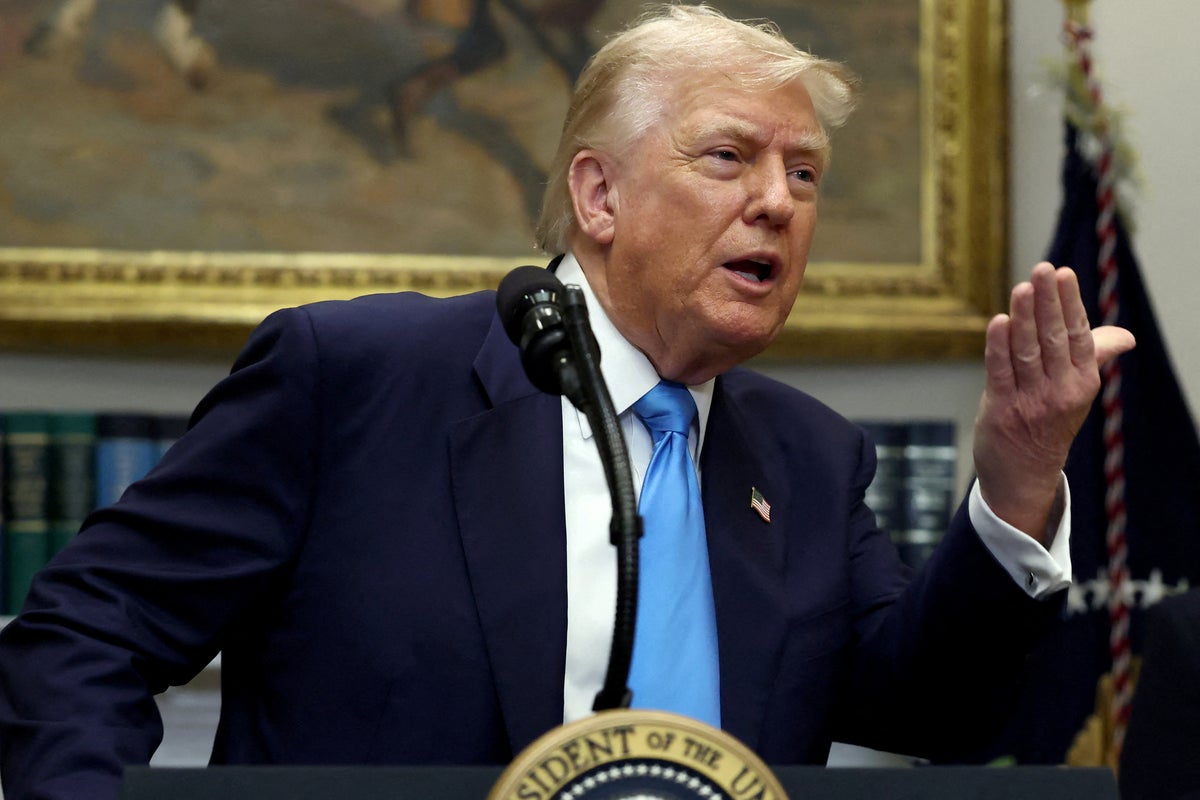A new poll shows Donald Trump underwater on the issue of his tariff agenda as Friday’s enforcement deadline looms for the “Liberation Day” measures he announced in April.
In 2024, Trump won election to a nonconsecutive second term, boosted by the same issues that propelled him to victory the first time around. Concerns over immigration and the economy were at the forefront of voters’ minds, though he received a key boost from the implosion of Joe Biden’s campaign.
But in a Times of London/YouGov poll out Thursday, the president’s tariff agenda is one of the biggest anchors driving down his approval numbers.
Some 48% of Americans graded Trump’s job performance over the first six months of his administration as poor, compared to just 21% who rated it excellent, 16% who rated it good and 11% who rated it as fair.
On the core issue of tariffs, Trump is clearly tanking — despite months of pronouncements from the White House of America’s impending “Golden Age.”
Four in ten Americans say that Trump’s tariffs will make the country poorer and stifle economic growth. Just 26% believe the White House’s line about economic prosperity coming down the pike.
And most alarmingly for the White House, inflation still ranks as the No. 1 issue for voters. That could prove to be dangerous ground for the president as the summer concludes with potentially sharp increases to consumer prices stemming from the president’s reciprocal tariffs, which are currently set as high as 50% with at least one trading partner, Brazil.
A CBS News poll further dove into the president’s declining numbers on the economy.
Six in 10 of voters under 30 now say that Trump’s policies are harming the economy, and making them worse off financially. Seven in 10 voters in the same category say that they didn’t believe the president is focused enough on lowering prices for consumers.
If Donald Trump is losing ground with the younger voters he peeled off from Democrats in 2024, Republicans are set for trouble in the midterm elections next year. Polling isn’t yet registering significant voter support for the GOP budget reconciliation package, the “big, beautiful bill”, as it’s been overshadowed by the president’s tariffs and mass deportation agenda, among other issues.
Another factor driving down Trump’s numbers with younger voters is Jeffrey Epstein.
The Justice Department blew up the investigation into Epstein, a convicted pedophile and sex criminal who died in 2019, when in early July the agency declared that the billionaire financier died by suicide, as had previously been found, and that no evidence linking him to accomplices, other than Ghislaine Maxwell, was uncovered.
The sudden declaration that the “Epstein Client List”, which Vice President JD Vance and others in the administration pledged to release, supposedly did not exist at all erupted into a wildfire on the MAGA right, particularly among Trump’s younger supporters.
Trump then spent the month of July embracing a series of increasingly obvious attempts at distraction, infuriating many and driving speculation even higher.
The Times/YouGov poll found that a much larger share of voters, more than four in ten, think that Trump and his team have partially or completely lied in their public statements regarding the case. Less than 20% of Americans believe them.
Immigration has been another issue where the president has lost ground as the White House and Department of Homeland Security have accelerated mass deportation programs under his second term. Images of immigration enforcement raids have caused massive protests in Los Angeles and alarmed many Americans including Trump-supporting independents around the country.
Nearly every poll on the Decision Desk HQ Average, with the exception of two surveys conducted by Republican outfits, now shows Trump with popularity ratings in the negative, some by double digits.
Some pollsters have speculated that Trump began at a deficit other presidents escaped in their first six months due in large part to the circumstances of his 2024 victory and the rank unpopularity that the Democratic Party encouraged with its jumbled mess of a re-election campaign for Biden and later Kamala Harris.
Coming into 2025, the president was already burdened by some of the highest disapproval ratings of any incoming president in history.

